第六专题从克林顿弹劾案看美国的弹劾制度案例
争鸣反思美国国会制度简介

【争鸣反思】美国国会制度简介【争鸣反思】美国国会制度简介美国国会制度简介国会是美国最高立法机构。
美国宪法旳第一条第一款就明文规定: “本宪法授予旳所有立法权, 属于由参议院和众议院构成旳合众国国会。
”美国国会旳重要权力有: 立法权、行政监督权、调查权、公约及官员任命旳审批权、宪法修改权、弹劾权。
【议会权力】国会旳权力首先是立法权, 它是美国惟一旳全国性立法机构。
宪法第一条第八款详细列举了赋予国会旳18项权力, 其中包括: 征税(包括关税、输入税和货品税等), 举债和贷款;管理内外贸易, 制定移民条例和破产法, 铸造钱币和确定度量衡旳原则, 设置邮政, 保护专利, 设置法院, 惩罚犯罪行为, 宣战, 招募军队和民兵, 等等。
国会旳另一项权力是行政监督权。
宪法将管理“钱袋子”旳权力交给了国会, 规定“除非经法律规定拨款, 不得从国库中提取款项”。
由于管着钱袋子, 国会可以对行政部门实行广泛而有效旳监督。
政府旳年度预算乃至一切收入和开支细目都需要国会同意。
国会有权拨款, 当然就有义务监督政府与否按国会旳规定使用了每一笔拨款。
国会为此设置了总审计署和国会预算局, 参众两院都设有预算委员会和拨款委员会等机构。
国会有广泛旳调查权, 可对它认为需要调查旳任何问题进行调查, 其调查旳对象可以是政府旳政策也可以是商品旳定价等等。
国会各委员会可以举行多种听证会, 传唤包括政府官员、企业界人士和科研人员在内旳所有有关人员到国会作证。
被传唤旳人假如拒绝作证, 将以藐视国会罪论处。
国会还可以设置尤其委员会对某个重大问题进行系统旳调查。
宪法还授予参议院对公约及官员任命旳审批权。
总统与外国缔结旳公约需要参议院三分之二多数旳同意。
总统提名旳部长、大使、法官、军官和其他行政官员也要参议院同意, 如参议院不一样意, 总统就需要重新提名。
国会有参与修改宪法旳权力。
宪法规定, 在参众两院三分之二旳议员认为必要时, 国会可对宪法提出修正案, 或根据全国三分之二州议会旳祈求, 召开制宪会议提出修正案。
美国司法制度中的弹劾程序对我国的启示
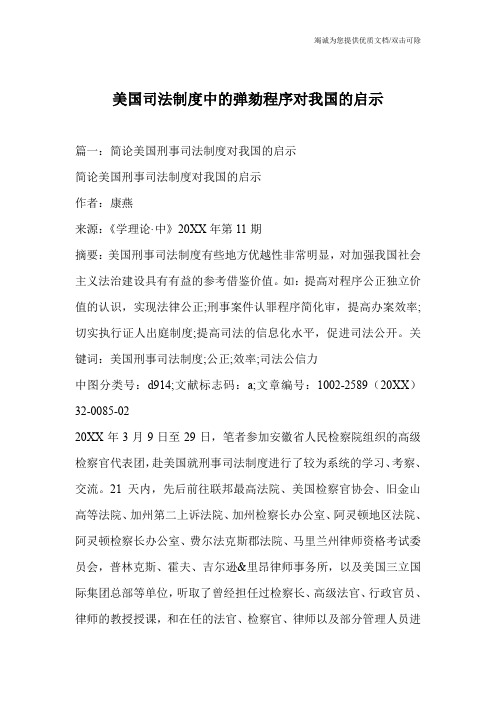
美国司法制度中的弹劾程序对我国的启示篇一:简论美国刑事司法制度对我国的启示简论美国刑事司法制度对我国的启示作者:康燕来源:《学理论·中》20XX年第11期摘要:美国刑事司法制度有些地方优越性非常明显,对加强我国社会主义法治建设具有有益的参考借鉴价值。
如:提高对程序公正独立价值的认识,实现法律公正;刑事案件认罪程序简化审,提高办案效率;切实执行证人出庭制度;提高司法的信息化水平,促进司法公开。
关键词:美国刑事司法制度;公正;效率;司法公信力中图分类号:d914;文献标志码:a;文章编号:1002-2589(20XX)32-0085-0220XX年3月9日至29日,笔者参加安徽省人民检察院组织的高级检察官代表团,赴美国就刑事司法制度进行了较为系统的学习、考察、交流。
21天内,先后前往联邦最高法院、美国检察官协会、旧金山高等法院、加州第二上诉法院、加州检察长办公室、阿灵顿地区法院、阿灵顿检察长办公室、费尔法克斯郡法院、马里兰州律师资格考试委员会,普林克斯、霍夫、吉尔逊&里昂律师事务所,以及美国三立国际集团总部等单位,听取了曾经担任过检察长、高级法官、行政官员、律师的教授授课,和在任的法官、检察官、律师以及部分管理人员进行了充分交流。
交流中,考察团简要介绍了我国的司法制度特别是检察制度,以及中国的法治建设成果,使我国的司法制度得到了正面的宣传,理正了美国司法同仁对我们国家人权保障、司法公开、检察监督等方面的认识。
特别是有关美国同仁对我国检察机关所行使的法律监督职能表示了极大的关注和兴趣,也深感在美国同样存在法院判决不公乃至腐败等问题,也亟须司法改革,应该借鉴中国的检察制度强化司法监督。
同时,通过学习考察,感到美国刑事司法制度有些地方优越性也非常明显,特别是在树立公平正义的绝对理念,提升司法公信力方面,对加强我国社会主义法治建设具有有益的参考借鉴价值。
一、提高对程序公正独立价值的认识,实现法律公正公正司法是提高司法公信力的前提和基础,党的十八大报告特别强调“确保审判机关、检察机关依法独立公正行使审判权、检察权”,将“公正”放在更加重要和突出位置。
克林顿弹劾案的政治和文化意义_1998年美国政局回顾

克林顿弹劾案的政治和文化意义———1998年美国政局回顾金灿荣1998 年美国政局的演变与特点1998 年美国内政方面的大事主要有两件:一件是克林顿因个人绯闻问题而遭到了弹劾, 另一件是中期选举。
其中, 美国民主、共和两党相互抗争的焦点是如何看待和处理克林顿的个人问题,绯闻案升级为弹劾案构成了1998 年美国政局演变的主要脉络。
通常说来,美国联邦一级的政治主要有两种内容,一是定期选举, 即各派政治势力通过推举自己的代表人物参加定期的公职选举,来角逐公共权力;二是制定公共政策,即各个政党、各种利益集团利用已经获得的公共权力,来重新分配利益。
其中,政策之争是每天都可能发生的政治活动, 是最常规的政治行为。
但是,在过去的一年里,白宫和国会之间,民主党和共和党之间, 政策性的冲突不是很多。
这里的一个原因是以克林顿为代表的民主党领导层大量吸收了传统上属于共和党温和派的政策, 在紧缩财政、打击犯罪、改革福利制度等政策领域与共和党没有根本分歧。
然而,更重要的原因是两党忙于在绯闻案上打政治仗, 从而推迟了立法议程, 于是烟草法案和政治捐款改革法案胎死腹中,社会保障制度和教育制度的改革原地踏步。
1998 年11 月3 日举行的中期选举, 是一个很重要的事件。
选举的结果告诉人们,美国社会的主流思潮正在告别80 年代的里根主义,而向中间路线“微调”,这将对今后的美国政治产生长期影响。
另外,州长和州议会选举的结果也有长期影响。
因为,在2000 年将进行10 年一度的人口普查之后,马上要调整国会众议员选区, 这项工作将由刚选出的州级机构完成。
重划选区会对政党的地区基础产生利弊不同的影响, 这种影响至少要延续10 年。
但是,由于绯闻过度曝光,中期选举在某种程度上成了对克林顿的信任投票, 结果使得这次选举本身的价值和意义没有得到完全的展现。
克林顿遭遇绯闻纠缠由来已久, 但是从1998 年初开始, 他的个人问题才真正与政治和法律挂钩。
一场由绯闻引发的总统弹劾案
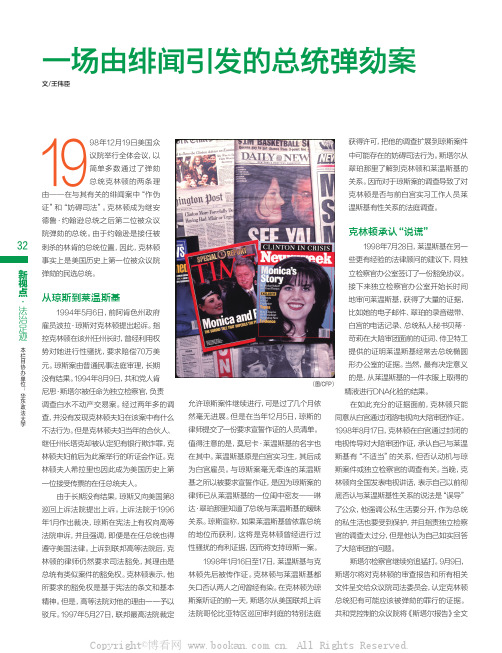
32新视点·法治足迹一场由绯闻引发的总统弹劾案文/王伟臣1998年12月19日美国众议院举行全体会议,以简单多数通过了弹劾总统克林顿的两条理由——在与其有关的绯闻案中“作伪证”和“妨碍司法”。
克林顿成为继安德鲁·约翰逊总统之后第二位被众议院弹劾的总统。
由于约翰逊是接任被刺杀的林肯的总统位置,因此,克林顿事实上是美国历史上第一位被众议院弹劾的民选总统。
从琼斯到莱温斯基1994年5月6日,前阿肯色州政府雇员波拉·琼斯对克林顿提出起诉。
指控克林顿在该州任州长时,曾经利用权势对她进行性骚扰,要求赔偿70万美元。
琼斯案由普通民事法庭审理,长期没有结果。
1994年8月9日,共和党人肯尼思·斯塔尔被任命为独立检察官,负责调查白水不动产交易案。
经过两年多的调查,并没有发现克林顿夫妇在该案中有什么不法行为。
但是克林顿夫妇当年的合伙人、继任州长塔克却被认定犯有银行欺诈罪,克林顿夫妇前后为此案举行的听证会作证。
克林顿夫人希拉里也因此成为美国历史上第一位接受传票的在任总统夫人。
由于长期没有结果,琼斯又向美国第8巡回上诉法院提出上诉。
上诉法院于1996年1月作出裁决,琼斯在宪法上有权向高等法院申诉,并且强调,即便是在任总统也得遵守美国法律。
上诉到联邦高等法院后,克林顿的律师仍然要求司法豁免,其理由是总统有类似案件的豁免权。
克林顿表示,他所要求的豁免权是基于宪法的条文和基本精神。
但是,高等法院对他的理由一一予以驳斥。
1997年5月27日,联邦最高法院裁定允许琼斯案件继续进行,可是过了几个月依然毫无进展。
但是在当年12月5日,琼斯的律师提交了一份要求宣誓作证的人员清单。
值得注意的是,莫尼卡·莱温斯基的名字也在其中。
莱温斯基原是白宫实习生,其后成为白宫雇员。
与琼斯案毫无牵连的莱温斯基之所以被要求宣誓作证,是因为琼斯案的律师已从莱温斯基的一位闺中密友——琳达·翠珀那里知道了总统与莱温斯基的暧昧关系。
克林顿法律诉讼案件分析(3篇)

第1篇一、引言比尔·克林顿是美国历史上备受争议的总统之一,他的政治生涯中曾遭遇多起法律诉讼。
其中,最为人所熟知的是1998年因性丑闻而引发的“莱温斯基案”和随后的弹劾案。
本文将对克林顿的法律诉讼案件进行详细分析,探讨其背后的原因、过程及影响。
二、案件背景1. 莱温斯基案1998年1月,美国独立检察官肯尼思·斯塔尔对克林顿总统进行了调查。
调查结果显示,克林顿在与实习生莫妮卡·莱温斯基发生不正当关系的同时,还试图掩盖此事。
此外,克林顿还涉嫌在1995年与前白宫实习生珍妮弗·弗劳尔斯发生关系,并试图误导调查。
2. 弹劾案在斯塔尔报告发布后,美国国会启动了对克林顿的弹劾程序。
1998年10月,众议院以233票对210票通过对克林顿的弹劾。
随后,参议院于1999年2月对克林顿进行审判。
最终,在50票赞成、50票反对的情况下,克林顿免于被定罪。
三、案件分析1. 莱温斯基案分析(1)原因分析①政治因素:克林顿在任期内面临诸多政治挑战,如经济问题、外交政策等。
在此背景下,莱温斯基案成为攻击克林顿的突破口。
②道德因素:克林顿的行为违背了总统的道德规范,损害了总统的形象。
③法律因素:克林顿涉嫌误导调查,触犯了法律。
(2)过程分析①调查阶段:斯塔尔调查组对克林顿进行深入调查,收集了大量证据。
②报告发布:斯塔尔报告发布后,舆论哗然,克林顿的声誉受到严重影响。
③国会弹劾:众议院启动弹劾程序,克林顿面临政治危机。
2. 弹劾案分析(1)原因分析①政治因素:共和党在国会占据多数,试图通过弹劾案削弱克林顿的执政地位。
②法律因素:克林顿涉嫌误导调查,触犯了法律。
(2)过程分析①众议院弹劾:众议院通过对克林顿的弹劾,使其面临政治危机。
②参议院审判:参议院对克林顿进行审判,最终克林顿免于被定罪。
四、案件影响1. 对克林顿的影响(1)政治影响:克林顿在弹劾案后,政治声誉受到严重损害,支持率大幅下降。
第六专题 美资产阶级代议制的确立与发展

第六专题欧美资产阶级代议制的确立与发展【考纲解读】第10讲英国君主立宪制和美国共和制的确立考点梳理考点1英国君主立宪制的确立一、背景1、《大宪章》和英国议会的产生使王权受到限制(1)产生:13世纪,英国贵族在市民的支持下,迫使国王在限制王权的《大宪章》上签字。
1265年,贵族、骑上和市民等召开会议,这就是英国议会的开端。
(2)作用:议会在王权衰落时产生,有限制王权的作用。
2、1640—1688年英国资产阶级革命推翻了封建专制王权(国王和议会的斗争)(1)原因:斯图亚特王朝的专制统治严重除阻碍了资本主义的发展,资产阶级和新贵族要求限制王权,扩大政治权利。
(2)经过:①1640年爆发革命,并一度建立共和国。
②1660年斯图亚特王朝复辟。
③1688年发生了“光荣革命”,英国资产阶级革命结束。
二、君主立宪的确立、发展和完善1、确立——《权利法案》颁布(1)时间: 1689 年(2)内容:以明确的法律条文,限制国王的权力,保证议会的立法权、财政权、司法权和军权等权力,并将议会所拥有的“自由”和权力用法律的形式加以肯定。
(3)意义:英国议会的权力逐渐超过王权,国王开始处于“统而不治”的地位,英国的君主立宪制确立起来。
2、发展——18世纪前期责任制内阁的形成(1)形成过程①光荣革命后,国王经常在一个秘密的小房间里召集一些贵族、大臣和高级教士开会,共商国家大事,人们称之为内阁会议。
②18世纪初,内阁还不是一个法定组织,只是少数大臣参加有一种会议。
③1721年担任财政大臣的下院多数党领袖沃尔波尔,经常主持内阁会议,内阁开始形成。
(2)主要内容①首相的产生方式及职责:由国王任命在下议院大选中获胜的多数党领袖为首相。
首相有权提名内阁成员即各部大臣决定国家的重要政策,掌握国家的行政大权。
事实上成为国家政治生活中的最高决策者和统治者。
②内阁的产生方式及职责:由首相提名内阁成员,送交国王批准,组成责任制内阁。
内阁政府机构即行政决策机构,内阁成员集体向议会负责,在大政方针上保持一致,要与首相共进退。
第六专题-从克林顿弹劾案看美国的弹劾制度.ppt

ko
(二)“法律至上”
立宪政体和法治的一个核心同时也是关键的原则, 就是宪法和法律具至高无上的权威,任何政府机 构和政府领导人,都不能凌驾于法律之上或超然 于法外。
法律面前人人平等也体现在对被弹劾总统的法律处置上。
按照美国宪法的规定,如果参议院审议之后经出席参议员的
第一条第三款:“所有弹劾案,只有参议院有权审理。在开庭审理弹劾案时, 参议员们均应宣誓或作代誓之宣言。如受审者为合众国总统,则应由最高法院 首席大法官担任主席;在未得出席的参议员的2/3 的同意时,任何人不得被判 有罪。”“弹劾案的判决,不得超过免职及取消其担任合众国政府任何有荣誉、 有责任或有俸给的职位之资格,但被判处者仍须服从另据法律所作之控诉、审 讯、判决及惩罚。”
只有当一个国家的政体结构和法律体系具体体现 了“法律至上”的要求,并通过政体和各种法律 手段来保障法律至上的权威,“法律至上”才能 是实实在在的。
ko
(三)“法律面前人人平等”
同“法律至上”一样,它不仅仅是一个原则或口号,而 是必须制度化、程序化。美国的总统弹劾制度,同样是实现 这一原则的重要法律制度。
ko
ቤተ መጻሕፍቲ ባይዱ
“贝壳弹劾”的突出特点就是由公民直接行使 监督权,对全体公民进行监督。“贝壳弹劾”之所 以被称之为弹劾制度的最初渊源,最为主要的原因 就是在“贝壳弹劾”中,提出放逐投票由公民会议 举手表决,决定放逐投票由公民通过贝壳的方式来 决定,这同弹劾制度中提出弹劾机关与审理弹劾机 关相互分离机制具有同一性。
美国国会的弹劾制度
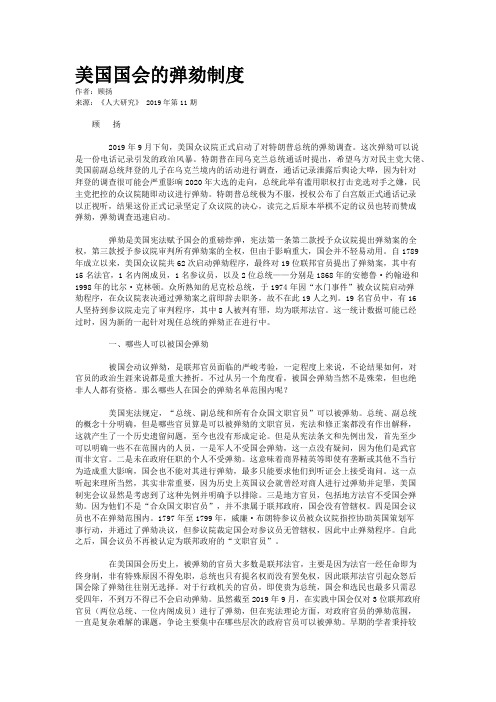
美国国会的弹劾制度作者:顾扬来源:《人大研究》 2019年第11期顾扬2019年9月下旬,美国众议院正式启动了对特朗普总统的弹劾调查。
这次弹劾可以说是一份电话记录引发的政治风暴。
特朗普在同乌克兰总统通话时提出,希望乌方对民主党大佬、美国前副总统拜登的儿子在乌克兰境内的活动进行调查,通话记录泄露后舆论大哗,因为针对拜登的调查很可能会严重影响2020年大选的走向,总统此举有滥用职权打击竞选对手之嫌,民主党把控的众议院随即动议进行弹劾。
特朗普总统极为不服,授权公布了白宫版正式通话记录以正视听,结果这份正式记录坚定了众议院的决心,读完之后原本举棋不定的议员也转而赞成弹劾,弹劾调查迅速启动。
弹劾是美国宪法赋予国会的重磅炸弹,宪法第一条第二款授予众议院提出弹劾案的全权,第三款授予参议院审判所有弹劾案的全权,但由于影响重大,国会并不轻易动用。
自1789年成立以来,美国众议院共62次启动弹劾程序,最终对19位联邦官员提出了弹劾案,其中有15名法官,1名内阁成员,1名参议员,以及2位总统——分别是1868年的安德鲁·约翰逊和1998年的比尔·克林顿。
众所熟知的尼克松总统,于1974年因“水门事件”被众议院启动弹劾程序,在众议院表决通过弹劾案之前即辞去职务,故不在此19人之列。
19名官员中,有16人坚持到参议院走完了审判程序,其中8人被判有罪,均为联邦法官。
这一统计数据可能已经过时,因为新的一起针对现任总统的弹劾正在进行中。
一、哪些人可以被国会弹劾被国会动议弹劾,是联邦官员面临的严峻考验,一定程度上来说,不论结果如何,对官员的政治生涯来说都是重大挫折。
不过从另一个角度看,被国会弹劾当然不是殊荣,但也绝非人人都有资格。
那么哪些人在国会的弹劾名单范围内呢?美国宪法规定,“总统、副总统和所有合众国文职官员”可以被弹劾。
总统、副总统的概念十分明确,但是哪些官员算是可以被弹劾的文职官员,宪法和修正案都没有作出解释,这就产生了一个历史遗留问题,至今也没有形成定论。
美国总统起诉法律责任案例(3篇)

第1篇一、案件背景1998年,美国第42任总统比尔·克林顿因与实习生莱温斯基的不正当关系,陷入了一场前所未有的政治风暴。
这场风暴不仅导致克林顿夫妇婚姻破裂,还使得克林顿成为美国历史上第一位面临弹劾的总统。
在此过程中,克林顿的法律责任问题成为社会各界关注的焦点。
二、案件经过1. 莱温斯基事件爆发1998年1月,美国《新闻周刊》杂志首先曝光了克林顿与实习生莱温斯基的不正当关系。
随后,美国国会众议院司法委员会开始对这一事件进行调查。
2. 克林顿否认性关系在调查过程中,克林顿坚决否认与莱温斯基发生性关系。
然而,美国联邦调查局(FBI)在调查过程中发现,克林顿在一份关于莱温斯基事件的证词中存在撒谎行为。
3. 克林顿弹劾案1998年10月,美国国会众议院通过弹劾克林顿的决议,指控他犯有“妨碍司法公正”和“伪证”两项罪名。
克林顿成为美国历史上第一位面临弹劾的总统。
4. 司法程序弹劾案提交至美国参议院进行审理。
在审理过程中,克林顿的法律团队积极为其辩护,强调克林顿的行为并未构成弹劾条款所规定的罪行。
5. 弹劾案结果2000年2月,美国参议院以50票赞成、50票反对的投票结果,未能达到弹劾克林顿所需的2/3多数票。
因此,克林顿没有被弹劾成功。
三、克林顿的法律责任1. 伪证罪在莱温斯基事件中,克林顿在国会作证时存在撒谎行为,被指控犯有伪证罪。
然而,美国参议院在审理弹劾案时,认为克林顿的行为并未构成伪证罪。
2. 妨碍司法公正在莱温斯基事件中,克林顿被指控妨碍司法公正。
美国参议院在审理弹劾案时,同样认为克林顿的行为并未构成妨碍司法公正。
3. 政治责任尽管克林顿在法律上并未被定罪,但他在政治上受到了极大的影响。
莱温斯基事件导致克林顿的支持率大幅下降,最终在2000年总统选举中败给了乔治·W·布什。
四、案例分析1. 法律责任与政治责任的区别在克林顿与莱温斯基丑闻案中,克林顿虽然面临法律诉讼,但最终并未被定罪。
美国总统弹劾制度与法治
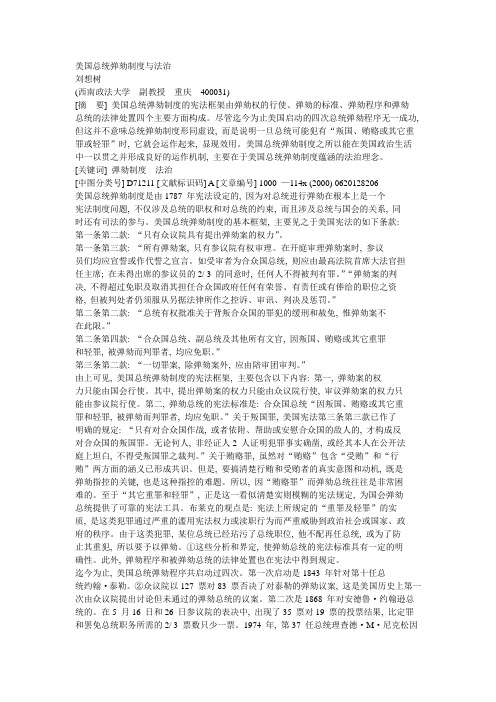
美国总统弹劾制度与法治刘想树(西南政法大学副教授重庆400031)[摘要] 美国总统弹劾制度的宪法框架由弹劾权的行使、弹劾的标准、弹劾程序和弹劾总统的法律处置四个主要方面构成。
尽管迄今为止美国启动的四次总统弹劾程序无一成功, 但这并不意味总统弹劾制度形同虚设, 而是说明一旦总统可能犯有“叛国、贿赂或其它重罪或轻罪”时, 它就会运作起来, 显现效用。
美国总统弹劾制度之所以能在美国政治生活中一以贯之并形成良好的运作机制, 主要在于美国总统弹劾制度蕴涵的法治理念。
[关键词] 弹劾制度法治[中图分类号] D71211 [文献标识码] A [文章编号] 1000 —114x (2000) 0620128206美国总统弹劾制度是由1787 年宪法设定的, 因为对总统进行弹劾在根本上是一个宪法制度问题, 不仅涉及总统的职权和对总统的约束, 而且涉及总统与国会的关系, 同时还有司法的参与。
美国总统弹劾制度的基本框架, 主要见之于美国宪法的如下条款:第一条第二款: “只有众议院具有提出弹劾案的权力”。
第一条第三款: “所有弹劾案, 只有参议院有权审理。
在开庭审理弹劾案时, 参议员们均应宣誓或作代誓之宣言。
如受审者为合众国总统, 则应由最高法院首席大法官担任主席; 在未得出席的参议员的2/ 3 的同意时, 任何人不得被判有罪。
”“弹劾案的判决, 不得超过免职及取消其担任合众国政府任何有荣誉、有责任或有俸给的职位之资格, 但被判处者仍须服从另据法律所作之控诉、审讯、判决及惩罚。
”第二条第二款: “总统有权批准关于背叛合众国的罪犯的缓刑和赦免, 惟弹劾案不在此限。
”第二条第四款: “合众国总统、副总统及其他所有文官, 因叛国、贿赂或其它重罪和轻罪, 被弹劾而判罪者, 均应免职。
”第三条第二款: “一切罪案, 除弹劾案外, 应由陪审团审判。
”由上可见, 美国总统弹劾制度的宪法框架, 主要包含以下内容: 第一, 弹劾案的权力只能由国会行使。
美国总统起诉法律责任案例(3篇)

第1篇一、引言美国总统起诉法律责任案例在历史上并不鲜见,其中最著名的莫过于克林顿总统与莱温斯基事件。
1998年,克林顿总统因与实习生莱温斯基的不正当关系被弹劾,最终面临法律责任。
本文将从事件背景、法律依据、审判过程和判决结果等方面对这一案例进行剖析。
二、事件背景1998年1月,美国新闻媒体曝光了克林顿总统与实习生莱温斯基的不正当关系。
这一事件引发了美国社会的广泛关注,舆论压力迫使克林顿总统承认错误。
随后,克林顿总统面临弹劾调查,最终被众议院通过弹劾条款。
三、法律依据1. 弹劾条款:美国宪法规定,总统、副总统及联邦法官因叛国罪、贿赂罪或其他重大罪行被弹劾时,应由众议院提出弹劾条款。
2. 伪证罪:美国刑法规定,故意提供虚假证词、证物或隐瞒事实,导致他人受到刑事处罚或免受刑事处罚,构成伪证罪。
3. 挪用公款罪:美国刑法规定,未经授权使用、占有或处置联邦政府财产,构成挪用公款罪。
四、审判过程1. 众议院审判:1998年10月,众议院开始审判克林顿总统。
审判过程中,众议院通过了两项弹劾条款,即伪证罪和挪用公款罪。
2. 参议院审判:1999年2月,参议院开始审判克林顿总统。
审判过程中,参议院需要以三分之二多数票通过弹劾条款,才能使克林顿总统免职。
3. 审判结果:经过审判,参议院最终以55票反对、45票赞成、1票弃权的结果,否决了众议院提出的弹劾条款。
克林顿总统得以继续担任总统职务。
五、判决结果分析1. 弹劾条款被否决:虽然克林顿总统被弹劾,但最终弹劾条款被否决,说明参议院认为克林顿总统的行为并未构成叛国罪、贿赂罪或其他重大罪行。
2. 法律责任:尽管克林顿总统未被免职,但他在事件中承担了一定的法律责任。
首先,他承认了与莱温斯基的不正当关系;其次,他在审判过程中,因伪证罪被罚款2000美元。
3. 社会影响:克林顿诉莱温斯基事件对克林顿总统的政治生涯产生了严重影响。
在事件爆发后,他的支持率一度下降。
此外,这一事件也引发了人们对政治道德和权力的关注。
克林顿法律诉讼案例分析(3篇)

第1篇一、引言比尔·克林顿,美国第42任总统,在任期间因其个人行为和法律诉讼而备受关注。
本文将针对克林顿的法律诉讼进行案例分析,重点探讨其与独立 counsel 的诉讼、弹劾案以及相关法律问题。
二、克林顿与独立 counsel 的诉讼1. 背景1998年,克林顿在任期间与一位名叫莫妮卡·莱温斯基的女实习生发生了不正当关系。
此后,克林顿对调查人员进行虚假陈述,试图掩盖事实真相。
美国国会决定任命独立 counsel 约翰·道格拉斯对克林顿进行调查。
2. 诉讼过程道格拉斯调查发现克林顿存在多项违法行为,包括向证人提供虚假陈述、妨碍司法公正等。
克林顿因此面临多项弹劾条款,包括妨碍司法公正、作伪证等。
3. 法律问题(1)独立 counsel 的权限:美国宪法规定,独立 counsel 在特定情况下可以对总统进行调查。
道格拉斯的调查权限主要来源于美国国会授权。
(2)总统的豁免权:美国宪法规定,总统在任期间享有一定的豁免权。
然而,道格拉斯认为克林顿的行为已经超出了豁免权的范围。
(3)虚假陈述的法律后果:美国法律明确规定,向证人提供虚假陈述是违法行为,应承担相应的法律责任。
三、克林顿弹劾案1. 背景道格拉斯的调查结果导致克林顿面临弹劾。
1998年12月,美国众议院通过弹劾克林顿的决议,指控其妨碍司法公正、作伪证等罪名。
2. 诉讼过程弹劾案在参议院进行审理。
参议院需要以三分之二多数票通过弹劾案,才能判定克林顿有罪。
最终,参议院以45票赞成、55票反对的结果否决了弹劾案,克林顿得以继续担任总统。
3. 法律问题(1)弹劾的标准:美国宪法规定,弹劾的标准是“叛国、贿赂或重大罪行”。
道格拉斯的调查结果显示,克林顿的行为可能构成“重大罪行”。
(2)总统的豁免权:在弹劾案中,参议院需要考虑总统的豁免权。
然而,参议院认为克林顿的行为已经超出了豁免权的范围。
(3)政治因素:弹劾案的结果受到政治因素的影响。
名人躲避法律的案例(3篇)
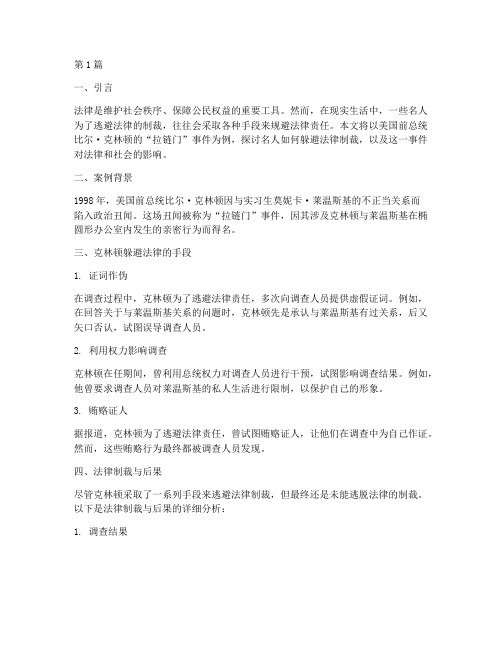
第1篇一、引言法律是维护社会秩序、保障公民权益的重要工具。
然而,在现实生活中,一些名人为了逃避法律的制裁,往往会采取各种手段来规避法律责任。
本文将以美国前总统比尔·克林顿的“拉链门”事件为例,探讨名人如何躲避法律制裁,以及这一事件对法律和社会的影响。
二、案例背景1998年,美国前总统比尔·克林顿因与实习生莫妮卡·莱温斯基的不正当关系而陷入政治丑闻。
这场丑闻被称为“拉链门”事件,因其涉及克林顿与莱温斯基在椭圆形办公室内发生的亲密行为而得名。
三、克林顿躲避法律的手段1. 证词作伪在调查过程中,克林顿为了逃避法律责任,多次向调查人员提供虚假证词。
例如,在回答关于与莱温斯基关系的问题时,克林顿先是承认与莱温斯基有过关系,后又矢口否认,试图误导调查人员。
2. 利用权力影响调查克林顿在任期间,曾利用总统权力对调查人员进行干预,试图影响调查结果。
例如,他曾要求调查人员对莱温斯基的私人生活进行限制,以保护自己的形象。
3. 贿赂证人据报道,克林顿为了逃避法律责任,曾试图贿赂证人,让他们在调查中为自己作证。
然而,这些贿赂行为最终都被调查人员发现。
四、法律制裁与后果尽管克林顿采取了一系列手段来逃避法律制裁,但最终还是未能逃脱法律的制裁。
以下是法律制裁与后果的详细分析:1. 调查结果美国独立检察官肯尼思·斯塔尔对克林顿进行了长达数月的调查,最终在1998年发布了调查报告。
报告指出,克林顿在调查过程中存在证词作伪、滥用职权等违法行为。
2. 众议院弹劾根据调查报告,美国众议院于1998年12月18日通过对克林顿的弹劾。
弹劾罪名包括滥用职权、妨碍司法公正等。
3. 司法审判1999年2月,克林顿在美国联邦大陪审团面前接受审判。
最终,陪审团判定克林顿犯有妨碍司法公正罪,但未对他进行定罪。
4. 后果尽管克林顿在司法审判中未被定罪,但他仍然受到了一系列后果。
首先,他的政治生涯受到了严重影响,被迫辞去总统职务。
弹劾案:让至高权力低头

56法治在线·立法议事卷入窃听案的美国总统1977年,尼克松在接受英国著名电视节目主持人弗罗斯特采访时,懊恼地说:“我弹劾了我自己。
”半个世纪之后回头看尼克松辞职事件,或许深层原因很多,但是从法律角度看,如果没有白宫录音磁带的存在,尼克松很可能不会辞职下台。
事件要从著名的水门窃听案说起。
水门大厦地处美国首都华盛顿特区西北区风景秀丽的波托马克河畔。
大厦正门入口处有一个小型人工瀑布,从高处飞流直下,水花飘舞飞扬,使整个建筑有了“水门”的美称。
大厦距国务院和肯尼迪国家表演艺术中心只有两条街,离白宫、国会大厦和五角大楼也很近。
公寓楼里的住户大多是内阁部长、国务院高官、参众两院议员和白宫高级幕僚。
办公楼的第六层当时则是美国民主党全国委员会的总部。
1972年6月17日凌晨,水门大厦的保安和附近巡逻的警察出于偶然,抓获了5个潜入民主党总部安装窃听器和偷拍文件的嫌犯。
其中一位名叫麦克德的特工,时任尼克弹劾案:让至高权力低头文/林海弹劾制度被称为“赶走暴政者”的利器,曾经令各国元首胆战心惊。
即使位高权重、声势鼎盛,却也最终难逃弹劾。
诸多弹劾案中,最为经典、影响最深远的,莫过于1974年的尼克松案。
松总统竞选班子的安全顾问。
经查发现,负责指挥这次行动的人物居然是白宫特别助理亨特和尼克松竞选班子的法律顾问利迪。
不过,后来越来越多的证据表明,尼克松本人并不是“水门窃听案”的幕后主谋。
他首次得知水门窃听案,竟然是后来在《迈阿密论坛报》上读到,一时啼笑皆非。
事件曝光之后迅速发酵。
尽管尼克松本人在8月29日声明,他的政府中没有人涉及此案。
但1973年1月,联邦司法部仍然对涉案7名人员进行了起诉。
其中5人认罪,2人被判刑。
在审判过程中,联邦地区法院被告知该案与白宫有牵连。
1973年5月至8月,参议院的特别委员会进行了公开听证会,对水门事件进行广泛的听讯调查,多名白宫官员被传讯。
这些证人的证词表示,尼克松很有可能参加了这一特别调查小组的活动。
美国总统弹劾案如何收场
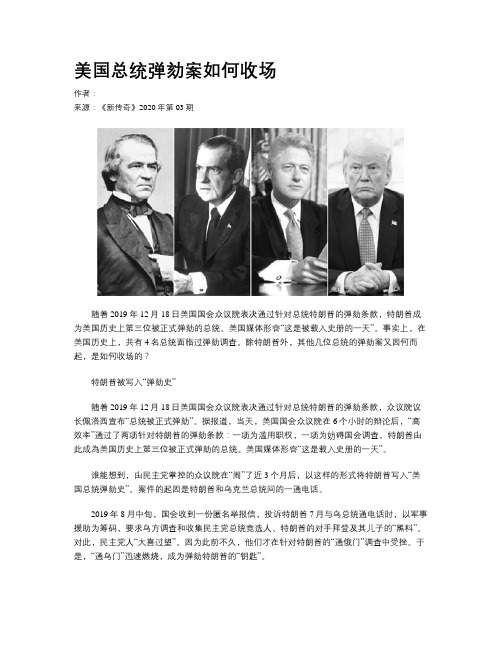
美国总统弹劾案如何收场作者:来源:《新传奇》2020年第03期随着2019年12月18日美国国会众议院表决通过针对总统特朗普的弹劾条款,特朗普成为美国历史上第三位被正式弹劾的总统。
美国媒体形容“这是被载入史册的一天”。
事实上,在美国历史上,共有4名总统面临过弹劾调查。
除特朗普外,其他几位总统的弹劾案又因何而起,是如何收场的?特朗普被写入“弹劾史”随着2019年12月18日美国国会众议院表决通过针对总统特朗普的弹劾条款,众议院议长佩洛西宣布“总统被正式弹劾”。
据报道,当天,美国国会众议院在6个小时的辩论后,“高效率”通过了两项针对特朗普的弹劾条款:一项为滥用职权,一项为妨碍国会调查。
特朗普由此成為美国历史上第三位被正式弹劾的总统。
美国媒体形容“这是载入史册的一天”。
谁能想到,由民主党掌控的众议院在“闹”了近3个月后,以这样的形式将特朗普写入“美国总统弹劾史”。
案件的起因是特朗普和乌克兰总统间的一通电话。
2019年8月中旬,国会收到一份匿名举报信,投诉特朗普7月与乌总统通电话时,以军事援助为筹码,要求乌方调查和收集民主党总统竞选人、特朗普的对手拜登及其儿子的“黑料”。
对此,民主党人“大喜过望”。
因为此前不久,他们才在针对特朗普的“通俄门”调查中受挫。
于是,“通乌门”迅速燃烧,成为弹劾特朗普的“钥匙”。
截至本刊发稿,弹劾进程已经进行了一大半。
那么,特朗普最终会否被弹劾下台?很多知名分析人士都认为特朗普不可能下台。
就连俄罗斯总统普京都说:“预计特朗普会挺过弹劾,继续执政。
”不说在美国历史上,从未有过总统被弹劾下台的先例。
况且,弹劾案提交至参议院后,面对的是共和党53对47席位的优势。
故多方均分析称,弹劾成功“几乎没戏”。
据最新民调显示,尽管特朗普弹劾议题近来如电视剧般闹得沸沸扬扬,但反对把特朗普弹劾下台的民意还在微幅上升。
事实上,尽管特朗普是第三位被正式弹劾的总统,但在美国历史上,还有3名总统曾面临弹劾调查。
美国的弹劾制度
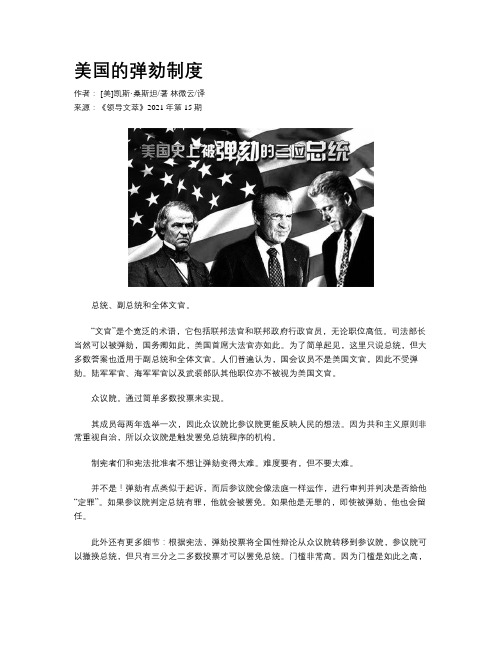
美国的弹劾制度作者: [美]凯斯·桑斯坦/著林微云/译来源:《领导文萃》2021年第15期总统、副总统和全体文官。
“文官”是个宽泛的术语,它包括联邦法官和联邦政府行政官员,无论职位高低。
司法部长当然可以被弹劾,国务卿如此,美国首席大法官亦如此。
为了简单起见,这里只说总统,但大多数答案也适用于副总统和全体文官。
人们普遍认为,国会议员不是美国文官,因此不受弹劾。
陆军军官、海军军官以及武装部队其他职位亦不被视为美国文官。
众议院。
通过简单多数投票来实现。
其成员每两年选举一次,因此众议院比参议院更能反映人民的想法。
因为共和主义原则非常重视自治,所以众议院是触发罢免总统程序的机构。
制宪者们和宪法批准者不想让弹劾变得太难。
难度要有,但不要太难。
并不是!弹劾有点类似于起诉,而后参议院会像法庭一样运作,进行审判并判决是否给他“定罪”。
如果参议院判定总统有罪,他就会被罢免。
如果他是无罪的,即使被弹劾,他也会留任。
此外还有更多细节:根据宪法,弹劾投票将全国性辩论从众议院转移到参议院,参议院可以撤换总统,但只有三分之二多数投票才可以罢免总统。
门槛非常高。
因为门槛是如此之高,任何弹劾都可能是徒劳的,至少在以罢免总统为目的之时。
在某些情况下,甚至在众议院许多议员对总统非常不满的情况下,弹劾的潜在无效性也可能阻碍众议院的进程。
为了理解参议院在整个弹劾过程中的作用,还要注意到根据宪法,为审讯弹劾案而开庭时参议员需宣誓,即“按照宪法和法律公正断案”。
这个宣誓与参议员的就职宣誓是不同的。
它标志着这一场合的独特庄严性。
强调一下“公正”这个词,这表明参议员应该像法官而非政治家那样行事。
如果总统被弹劾且由参议院进行审判,众议院议员将继续发挥重要作用,即挑选像检察官一样的“管理人员”。
他们负责提出定罪论据。
基于这个角色定位,众议院选择优秀律师作为成员是很有意义的。
事实上,在少数的几个弹劾案例中就试图做到这一点。
支持弹劾和罢免总统的制宪代表们想要完成一件很困难的事情。
美国总统克林顿被弹劾月日历史事件的危机

美国总统克林顿被弹劾月日历史事件的危机1998年,美国总统比尔·克林顿陷入了一场震动全球的政治丑闻,他因涉嫌性丑闻而面临弹劾的危机。
这一事件对美国政治与历史产生了深远的影响。
本文将就美国总统克林顿被弹劾的月历史事件的危机进行详细探究。
第一节:背景描述1998年,美国政坛风云变幻。
当时的总统克林顿被控与实习生莫尼卡·劳恩斯基有染,并在证词中作假。
这一事件被媒体广泛报道,引发了公众的轩然大波。
克林顿在强烈的政治压力下,迎来了被弹劾的威胁。
第二节:弹劾的程序美国宪法规定,总统可以因为“叛国、贿赂或其他高罪”而遭到弹劾。
基于这一规定,美国国会对克林顿的行为展开了调查。
特别检察官肯尼斯·斯塔尔建议对克林顿提出指控,并提交给众议院。
1998年12月,众议院通过第一项弹劾条款,认为克林顿在面对大陪审团时对其个人与劳恩斯基关系进行了虚假陈述。
而第二项弹劾条款则指控克林顿在涉及自己私生活的民事诉讼中犯下了妨碍司法罪。
随后,两项弹劾条款提交给联邦参议院进行进一步的审议。
第三节:参议院审议1999年1月,联邦参议院开始对克林顿的弹劾案进行审议。
这成为了一个备受瞩目的历史事件。
在审议过程中,参议院的任务是对克林顿是否犯有指控中的罪行进行判断。
当时需要三分之二的参议员支持才能定罪,弹劾罪名成立后克林顿将被罢免。
然而,克林顿最终并未被定罪,他获得了免疫权。
在1999年2月的投票中,针对克林顿第一项罪名的投票结果为55票“有罪”和45票“无罪”,而针对第二项罪名的投票结果为50票“有罪”和50票“无罪”。
因此,克林顿并未达到罢免所需的三分之二票数。
第四节:影响与反思克林顿的弹劾事件对美国政治产生了深远影响,并引发了公众对政府道德与领导能力的质疑。
这场历史危机也让人们反思了美国政治与法律体系中的漏洞与不足之处。
一方面,该事件使得克林顿的声誉受到了严重损害,世人对他的评价往往将他的私生活与政治事务联系在一起。
法律英语经典案例2005年审判克林顿总统弹劾案
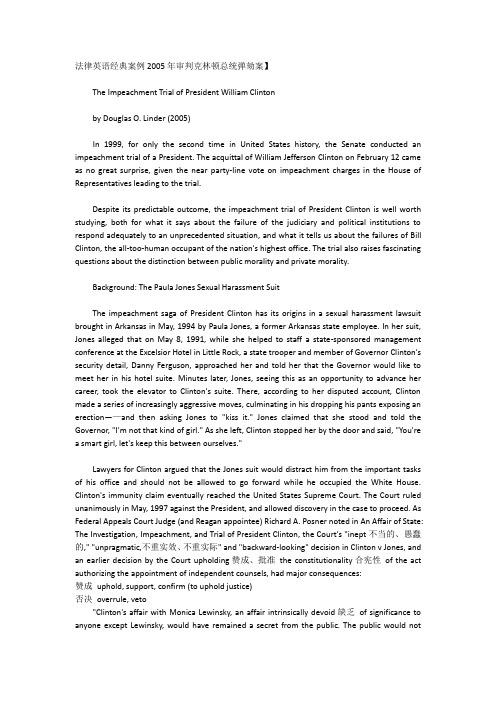
法律英语经典案例2005年审判克林顿总统弹劾案】The Impeachment Trial of President William Clintonby Douglas O. Linder (2005)In 1999, for only the second time in United States history, the Senate conducted an impeachment trial of a President. The acquittal of William Jefferson Clinton on February 12 came as no great surprise, given the near party-line vote on impeachment charges in the House of Representatives leading to the trial.Despite its predictable outcome, the impeachment trial of President Clinton is well worth studying, both for what it says about the failure of the judiciary and political institutions to respond adequately to an unprecedented situation, and what it tells us about the failures of Bill Clinton, the all-too-human occupant of the nation's highest office. The trial also raises fascinating questions about the distinction between public morality and private morality.Background: The Paula Jones Sexual Harassment SuitThe impeachment saga of President Clinton has its origins in a sexual harassment lawsuit brought in Arkansas in May, 1994 by Paula Jones, a former Arkansas state employee. In her suit, Jones alleged that on May 8, 1991, while she helped to staff a state-sponsored management conference at the Excelsior Hotel in Little Rock, a state trooper and member of Governor Clinton's security detail, Danny Ferguson, approached her and told her that the Governor would like to meet her in his hotel suite. Minutes later, Jones, seeing this as an opportunity to advance her career, took the elevator to Clinton's suite. There, according to her disputed account, Clinton made a series of increasingly aggressive moves, culminating in his dropping his pants exposing an erection——and then asking Jones to "kiss it." Jones claimed that she stood and told the Governor, "I'm not that kind of girl." As she left, Clinton stopped her by the door and said, "You're a smart girl, let's keep this between ourselves."Lawyers for Clinton argued that the Jones suit would distract him from the important tasks of his office and should not be allowed to go forward while he occupied the White House. Clinton's immunity claim eventually reached the United States Supreme Court. The Court ruled unanimously in May, 1997 against the President, and allowed discovery in the case to proceed. As Federal Appeals Court Judge (and Reagan appointee) Richard A. Posner noted in An Affair of State: The Investigation, Impeachment, and Trial of President Clinton, the Court's "inept不当的、愚蠢的," "unpragmatic,不重实效、不重实际" and "backward-looking" decision in Clinton v Jones, and an earlier decision by the Court upholding赞成、批准the constitutionality合宪性of the act authorizing the appointment of independent counsels, had major consequences:赞成uphold, support, confirm (to uphold justice)否决overrule, veto"Clinton's affair with Monica Lewinsky, an affair intrinsically devoid缺乏of significance to anyone except Lewinsky, would have remained a secret from the public. The public would nothave been worse for not knowing about it. There would have been no impeachment inquiry, no impeachment, no concerns about the motives behind the President's military actions against terrorists and rogue流氓、歹徒states in the summer and fall of 1998, no spectacle of the United States Senate play-acting表演at adjudication判决. The Supreme Court's decisions created a situation that led the President and his defenders into the pattern of cornered-rat behavior that engendered a constitutional storm and that may have embittered American politics, weakened the Presidency, distracted the federal government from essential business, and undermined the rule of law."判决n.judgement, judgment, adjudgement, adjudication(adjudication of bankruptcy)v.adjudge, adjudicate, doomAs a result of the Supreme Court's action诉讼, Judge Susan Weber Wright allowed discovery to proceed in the Paula Jones lawsuit. Judge Wright ruled that lawyers for Jones, in order to help prove her sexual harassment claim, could inquire into any sexual relationships that Clinton might have with subordinates either as Governor of Arkansas or as President of the United States. A critical moment in the cascade of events that would eventually lead to impeachment came on December 5, 1997 when Jones's lawyers submitted a list of women that they would like to depose宣誓证明. Included on the list the name of Monica Lewinsky.The President and Monica LewinskyMonica Lewinsky came to Washington in July 1995 to work as a White House intern at age 21, newly graduated from Lewis and Clark College in Portland. In her first few months on the job, the aggressive and sexually experienced Lewinsky met and flirted with the President, but no opportunities for close personal contact arose. In November 1995, however, Lewinsky was assigned to the West Wing and she soon found herself alone with Clinton. He asked if he could kiss Lewinsky. She quickly consented. Later that evening, the two would have the first of what eventually would be ten sexual encounters over a sixteen-month period. After eight of the encounters had taken place, in April 1996, Clinton's deputy chief of staff——most likely aware of the threat the young intern posed——reassigned Lewinsky to a position in the Department of Defense. The following month Clinton told a disappointed Lewinsky ("He was my sunshine," she later told a grand jury) he was ending the relationship, but he revived it briefly in early 1997.The encounters followed a predictable pattern. Generally they occurred on weekend mornings in and around the Oval Office (including a study, a hallway, and a bathroom), when few people except Clinton's personal secretary, Betty Currie, would be around the West Wing. Although many private meetings between the two involved no sexual activity, when they did they generally included Lewinsky fellating口交the President and the President fondling her breasts and genitalia. On three occasions, Lewinsky performed oral sex while the President talked on the phone to members of Congress. Lewinsky told Clinton she would like to have vaginal intercourse with him, but he resisted. He also terminated the oral sex sessions before ejaculation until their last two encounters.When Clinton again told Lewinsky in May 1997 that their sexual relationship was over, sheredoubled efforts that began the previous year to enlist the President's assistance in finding employment. Lewinsky received a job offer from U. N. Ambassador Bill Richardson several months later, but she turned it down, preferring to find private sector employment. Clinton golfing buddy and power broker Vernon Jordan, acting at what he presumed to be the President's request through Betty Currie, met with Lewinsky to discuss employment possibilities in November 1997.Less than two weeks after Lewinsky's name appeared on the Jones deposition list, Clinton told her the news. He advised her that filing an affidavit宣誓口供might avoid the necessity of a deposition (but only, he need hardly have said, if she denied a sexual relationship), and he reminded her of their "cover story" for her frequent trips to Oval Office——that she was just delivering documents. Two days after discussing the matter with Clinton, Lewinsky received a subpoena 传票to appear for a deposition in January 1998. She called Vernon Jordan, who again met with her and referred her to an attorney, who proceeded to draft an affidavit that reflected her denial of any sexual involvement with the President.Just after Christmas, Lewinsky spoke again with Clinton, raising her concern that the subpoena had requested that she bring to the deposition any gifts——and there were many——that she had received from him. Although Clinton apparently informed Lewinsky that she was obligated有义务to give the lawyers for Jones any gifts in her possession, a call came later that day from Currie, indicating that she understood Lewinsky had some items she'd like to give her for safekeeping. (Currie, in her testimony, disagreed with Lewinsky's version of events and claimed that the call about the presents came from Lewinsky, not her.) Currie drove to Lewinsky's home and carted away a box of Clinton gifts and put them under her bed.In early January 1998, Lewinsky signed an affidavit, with the intent of filing it for the Jones case, claiming her relationship with the President was non-sexual. The day after Lewinsky showed the affidavit to Vernon Jordan, Jordan made a call to Ronald Perelman, a friend and member of the Board of Directors of Revlon, encouraging him to hire Lewinsky. The job offer from Revlon came just two days later.Linda Tripp Gets InvolvedThe source of the information that put Monica Lewinsky's name on the deposition list for the Jones case was Linda Tripp. Tripp had served in the Bush White House, and was held over继任in her job when Clinton became president in 1993. Tripp came to despise 轻视Clinton. In 1996, when she considered how to expose揭露what she considered to be West Wing scandals, she contacted a conservative literary agent and self-described Clinton-hater, Lucianne Goldberg. Goldberg urged Tripp to write an expose', but at that time Tripp's concern with keeping her job caused her to reject the suggestion.Tripp's name came to public attention in August 1997 when it appeared in a Newsweek article in which she recalled running into a White House volunteer, Kathleen Willey, shortly after Willey had been kissed and fondled by Clinton in his private office. (Willey, according to Tripp,was "happy and joyful" and the incident was "not a case of sexual harassment.") Paula Jones's lawyers, of course, took note of Tripp's account——and undoubtedly determined at that time to add Tripp to their list of potential witnesses.Months before the Willey story broke, however, Tripp learned from her then-friend, Monica Lewinsky, that she was having an affair with the President. Tripp told the reporter for Newsweek, Michael Isikoff, when he approached her to ask about Willey's encounter with Clinton that the better story involved a White House intern, who she left unnamed. Tripp, partly for her own self-defense and partly out of a desire to damage the President's reputation, began secretly taping (in violation of the state law of her home state of Maryland) her own conversations with Lewinsky with a $100 recorder she picked up from a nearby Radio Shack.During one of her taped conversations with Lewinsky in November 1997, Tripp learned that her friend had in her closet a blue dress that still bore the semen stain from a sexual encounter with the President some nine months earlier. Tripp excitedly called Michael Isikoff with the remarkable news, and urged that the reporter have the dress DNA tested. Isikoff pointed out an obvious problem: even if Newsweek could somehow obtain the dress, the test would be meaningless without a sample of Clinton's DNA——and how could the magazine get that?Tripp, however, continued to take an active interest in preserving the semen evidence, urging Lewinsky not to have the dress dry cleaned——as she had planned——for a family occasion because it might be useful for her own "protection" and, besides, the dress made her look "really fat."In early January 1998, at the encouragement of Luciane Goldberg and backers of the Jones lawsuit (who, by this time, had been filled in by Tripp on details of the Lewinsky matter), Tripp contacted Kenneth Starr's Office of Independent Counsel. Tripp told Starr's staff all she knew about the Lewinsky-Clinton scandal and presented them with a collection of damaging tapes of her private conversations with Lewinsky.The Starr InvestigationBy late 1997, despite the several year long "Whitewater" investigation costing tens of millions of dollars, Kenneth Starr's Office of Independent Counsel (OIC) failed to produce the necessary "substantial and credible" evidence of an impeachable offense that would justify referring the matter to Congress for further action. It seemed only a matter of weeks before the OIC would be forced to close its far-reaching effort to identify wrongdoing by the President.At the same time, Judge Wright appeared ready to dismiss Paula Jones's sexual harassment suit after testimony in her deposition proved inconsistent with her initial pleadings. (For example, in her pleadings诉状Jones claimed that the incident at the Excelsior Hotel took place after 2:30, but in her deposition口供、证言she placed the encounter in the morning after evidence made clear that the Governor had returned to his mansion after the luncheon at the hotel.) The judge also seemed angered and frustrated by leaks of salacious 诲淫的details in the press, in obvious defiance of her gag限制言论order, and that presented a second justification for dismissal. ThePresident's camp had every reason to be confident that the case would never go to trial——if they could prevent any new bombshells about Clinton's sexual activities with subordinates.In January 1998, it all blew up. According to the Starr Report eventually submitted to Congress, that month the OIC "received information that Monica Lewinsky was attempting to influence the testimony of one of the witnesses in the Jones investigation [Tripp], and that Ms. Lewinsky herself was prepared to provide false information under oath in that lawsuit." The Report added that "Ms. Lewinsky had spoken to the President……about being subpoenaed to testify in the Jones suit." Based on these representations, and a "sting tape" of a conversation between Tripp and Lewinsky, the OIC sought and obtained permission from Attorney General Reno to expand his investigation to encompass the Lewinsky affair. (In seeking permission from Reno, the OIC neglected to mention its prior contacts with lawyers for Paula Jones, including Starr's own previous discussions with Jones's lawyers on the immunity issue that reached the Supreme Court. Had the OIC disclosed these contacts, a conflict concern might have either resulted in their request being turned down, or a new independent counsel appointed.)On January 16, the day before the President would be deposed in the Jones case, authorization for the expanded investigation came from Janet Reno. That afternoon, acting in concert with Linda Tripp who had invited Lewinsky to the food court of the Pentagon City Mall for lunch, FBI agents acting for the OIC seized Lewinsky and escorted her to room 1012 in the Ritz-Carlton Hotel, where OIC lawyers would——for the next eleven hours——press her to cooperate in their investigation by agreeing to wear a wire and secretly record her conversations with President Clinton. Despite warnings her that she could face up to 27 years in prison for perjury and obstruction of justice (in fact, two years would be a far more likely punishment), Lewinsky refused. Her decision might well have saved the Clinton presidency.The next day, lawyers for Paula Jones, having been fully briefed on the details of the Lewinsky affair, threw a series of questions at the President during his deposition that left him surprised and, at times, flustered慌张. Clinton, however, generally stuck to his script and continued to deny the existence of a sexual relationship with Lewinsky. In fact, the President went so far as to deny ever even being "alone" with Lewinsky.Back in his Oval Office on the following day, Clinton discussed the Lewinsky affair with Betty Currie in a manner that strongly suggested an attempt to influence her future statements about her boss's relationship with the young intern. He told his personal secretary, "We were never really alone," "You could see and hear everything," and "Monica came on to me, and I never touched her, right?" Clinton would later spin the discussion as(T o provide an interpretation of (a statement or event, for example), especially in a way meant to sway影响public opinion) an attempt to refresh his recollection about his relationship with Lewinsky——a wildly implausible explanation, given that some of the questions he asked Currie she was in no position to answer.The American public first learned of allegations of a Clinton affair with Lewinsky on January 21, 1998. The President stuck with his "deny-it-all" strategy, at one point memorably wagging his finger in a televised interview and insisting, "I did not have sexual relations with that woman,Miss Lewinsky." Several of Clinton's aides (including Sidney Blumenthal, who was later deposed in the Senate trial) assured by the President that his relationship with Lewinsky was non-sexual, appeared in various venues to denounce Starr's investigations as "a puritanical清教徒似的、极端拘谨的witch hunt" and to call into question Lewinsky's credibility.The denials from the White House continued into summer, when the President became aware of that his semen stain remained on the blue dress that Monica Lewinsky wore into the Oval Office on a February day in 1997, and that Lewinsky had signed an immunity agreement with the Office of Independent Counsel. In the meantime, Starr's office had interviewed Secret Service agents, friends of Lewinsky, examined hundreds of emails and White House telephone records, and listened to dozens of hours of taped conversations between Tripp and Lewinsky.On August 17, 1998, the President faced a federal grand jury called to consider whether he committed perjury伪证罪, or otherwise obstructed justice, in the Paula Jones case. Clinton maintained that while he was being as unhelpful as possible to Jones's lawyers in his earlier deposition, he had not actually lied. He insisted on his right to adopt a very narrow (and very odd) definition of "alone," and stated that oral sex was not, in his opinion, "sexual relations" within the meaning of that term as adopted in the Jones case. He conceded that fondling Lewinsky would be "sexual relations" and so, implicitly, denied the former intern's allegation that he had fondled her breast and genitalia on several occasions. He explained his discussion with Currie as an innocent attempt to check his recollection of facts against hers, and denied that Vernon Jordan's job hunting efforts were in any way tied to Lewinsky's decision to file an affidavit falsely denying a sexual relationship with the President. The night, when his exhausting deposition was over, Clinton appeared on national television from the Map Room of the White House to admit, "I did have a relationship with Miss Lewinsky that not appropriate"——and to lash out at Kenneth Starr for invading his private life. "It is time to stop the pursuit of personal destruction," the President said, "and get on with our national life."The House Votes to ImpeachIn the days following his grand jury testimony, calls for impeachment mounted. In the House, Republican Majority Whip Tom De Lay called his aides back to Washington from their summer vacations to announce that it would be his mission to drive Bill Clinton from office. "This is going to be the most important thing I do in my political career," he told them, " and I want all of you to dedicate yourselves to it or leave." De Lay arranged a conference call that included most of the House Republican leadership to urge impeachment. Although Speaker Newt Gingrich initially opposed the idea, by the time the call was over, he had come around to believing the cause was right.In the days following Clinton's admission that he had lied to the American public about the Lewinsky affair, many Congressional expressed their disappointment with the President. Vermont Senator Patrick Leahy scolded Clinton: "Bill, you're a fool!You're a damn, damn, damn fool!" California Senator Dianne Feinstein announced that her "trust in his credibility has been badly shattered." New York Senator Patrick Moynihan warned that "we can be our own worst enemiesif we do not hew to坚持our best standards." In late August 1998, the survival of the Clinton presidency seemed in real doubt.Kenneth Starr was required by law to present the House with "any substantial and credible information" that might provide a ground for impeachment. On September 9, Starr piled thirty-six boxes of evidence on the Lewinsky scandal into two vans and ordered them driven to Capitol Hill for deposit. Two days later, the Starr Report, a 453-page summary of the evidence against the President, was released to the public over the Internet. The report outlined the case for eleven counts against Clinton, including perjury in his Jones and grand jury depositions, obstruction of justice, and one count asserting abuse of office. Late night comics连环漫画and critics of the President relished享受、品味the incredibly explicit details of the report, ranging from the fact that the President took calls from Congressman while receiving oral sex to an account of his inserting his cigar in Lewinsky's vagina. The embarrassing details, which were unnecessary to the prosecution case, were seen by some commentators as a spiteful effort by the OIC to debilitate使虚弱the Clinton presidency.Responsibility for recommending action on impeachment fell to the House Judiciary司法的、审判的Committee and its Chairman, Henry Hyde. (Hyde, meanwhile, had his own problem to manage: reports surfaced that the widely respected septuagenarian70岁的人congressman had had an affair some thirty years earlier.) The committee voted to release a videotape of Clinton's four hours of testimony before the grand jury, as well as over 7,000 other pages of evidence, including DNA test results, love notes from Lewinsky to the President, transcripts of Lewinsky's conversations with Linda Tripp, and White House phone logs. After pouring over the evidence and listening to its appointed counsel, the Committee, voting 21 to 16 along party lines on October 5, authorized a full impeachment inquiry. Democrats on the committee, arguing that the case came down to "lying about sex," generally favored censure as an alternative. The Committee's decision was ratified by the full House three days later, with thirty-one Democrats joining the majority.Mid-term elections on November 3 brought good news for the President. Before the election, Gingrich predicted that Republicans would gain twenty House seats. In fact, they lost five. Despite the losses, widely interpreted as a public vote against impeachment, Hyde determined to press forward with the inquiry, although on a faster timetable. Privately, Hyde thought impeachment was dead, telling Democratic congressman Charles Schumer, "Charlie, don't worry about it: the committee will report out the articles, but they'll die on the House floor." The disappointing election results convinced Bob Livingston to challenge Gingrich for the position of House Speaker. Within hours of Livingston's decision, Gingrich announced his resignation. One week after Gingrich's surprise announcement, there was another big development: Clinton and Paula Jones finally agreed to settle the sexual harassment lawsuit that had caused all the President's miseries.Over the course of the next month, the Judiciary Committee considered the evidence and sought to separate Clinton's minor transgressions违犯(法律)from those that might form the basis for articles of impeachment. The highlight of the committee's hearings came with thetestimony of Kenneth Starr. While Republican members asked questions designed to help Starr lay out his case against the President, Democratic members——preferring to put Starr himself on trial——asked questions that supported their goal of portraying Starr as a zealot狂热分子. Democratic member John Conyers characterized Starr as "a federally paid sex policeman." As another part of the process, the Committee drafted a set of 81 questions for the President to answer concerning a series of events relating to the Lewinsky scandal and his prior testimony. The President answered, but——in the opinion of Committee Republicans——in a quarrelsome, unresponsive way. Frequently, he responded to questions by saying he did not recall something. Irritated by his answers, some undecided House Republicans moved toward favoring impeachment.After listening to a panel of experts on impeachment and lawyers for the President earlier in the week, the Judiciary Committee voted on December 11 and 12 to approve four articles of impeachment. The next day, Hyde joined Tom De Lay and Majority Leader Richard Armey in calling for the President to resign. Clinton, the same day, tells reporters that the thought "never crossed my mind."The next week, as the President juggled诓骗ordering U. S. planes to launch missile strikes on Iraq with phone calls to undecided Republican House members, impeachment moved to a final vote in the House. Adding to the drama was the resignation the same day of Bob Livingston on the floor of the House following disclosure of an affair of his own (stemming from an offer by Hustler publisher Larry Flynt to pay $1 million for "documentary evidence of illicit sexual relations" involving high-ranking members of Congress). Minority Leader Richard Gephardt rose to ask Livingston to reconsider his decision to step down, telling his colleagues, "We need to stop destroying imperfect people at the alter of an unobtainable morality." When the final vote came, the House approved two of the four impeachment articles sent up by the Judiciary Committee, rejecting Article II, based on perjury in the Jones deposition, and Article IV containing general charges relating to his unresponsive answers to Judiciary Committee questions and abuse of his office.That evening, December 19, 1998, on the South Lawn of the White House surrounded by Democratic supporters, the President thanked those who voted against the impeachment articles and urged that we "stop the politics of personal destruction. We must," he said, "get rid of the poisonous venom of excessive partisanship, obsessive animosity仇恨, and uncontrolled anger." Polls taken that week suggested that the American public sided with Clinton, with 60% opposing impeachment.Trial in the Senate"Hear, ye!Hear, ye!Hear, ye!" the Senate's sergeant at arms called out on January 7, 1999. "All persons are commanded to keep silent, on pain of imprisonment关押、束缚, while the House of Representatives is exhibiting to the Senate the articles of impeachment against William Jefferson Clinton, president of the United States."The impeachment trial of the President formally opened before all 100 senators with the reading of the charges against the President and the swearing in of the presiding officer, Chief Justice William Rehnquist, dressed in a black robe with four bright yellow braids on each sleeve, a fashion idea that Rehnquist had taken from a judge in Gilbert and Sullivan's Iolanthe.The next day, the Senate met in a closed session to hammer out a bipartisan plan (passed on a vote of 100 to 0) for procedural rules to govern the trial. Each side would get twenty-four hours to present its case without witnesses. The Senators would then have two days for a question-and-answer session, Only after that would the Senate vote on motions to dismiss or requests for witnesses.The House managers, who would prosecute Clinton in the Senate, plotted strategy. A key question they faced was whether to call live witnesses and, if so, how many and which ones. A preliminary list drawn up included many names: the judge in Jones case, Susan Weber Wright, Monica Lewinsky, Secret Service agents, Kathleen Willey (a White House volunteer who claimed to have been groped猥亵、摸索by Clinton), Vernon Jordan, various Clinton aides, and even New York mayor Rudy Giuliani (who, as a former U. S. attorney, could address the subject of prosecutions of public officials). Senate Majority Leader Trent Lott, and Minority Leader Tom Daschle, were not, however, thrilled at the prospect of live witnesses. They saw live witnesses as a threat to their desire to stage a speedy and dignified trial that would not become an embarrassing national spectacle. Both leaders understood that the prospects of at least a dozen Democratic Senators voting to convict宣告有罪, the minimum necessary for the required two-thirds vote, were exceedingly slim——barring some new shocking revelation about the President's conduct.被告defendant,respondent, accused原告complaint, plaintiff, prosecutor宣告有罪convict宣告无罪、无罪释放acquittalThe trial got underway in earnest认真地on January 14. "Well, let's begin," the Chief Justice announced, adding, "Fight fair." House Manager James Sensenbrenner opened the prosecution case with a monotonous summary of the case that left some Senators, such as Alaska's Ted Stevens, asleep. Other senators, including Joseph Biden, Arlen Specter, an Bob Kerry, took extensive notes. Following Sensenbrenner, three other managers had somewhat better luck keeping senators alert with a parade of charts, timelines, and video clips aimed at demonstrating a pattern of illegal obstruction of justice. Even Democratic senators conceded that Manager Asa Hutchinson's outlining of the sequence of events in the Lewinsky affair was especially effective. Some appeared to be having second thoughts about their intended votes.As opening arguments continued for another four hours the next day, senators struggled to remain engaged during what became, in Peter Baker's description in The Breach, "a law school seminar on perjury and obstruction of justice." The only break in the tedium came when Iowa's。
企业MBA讲义
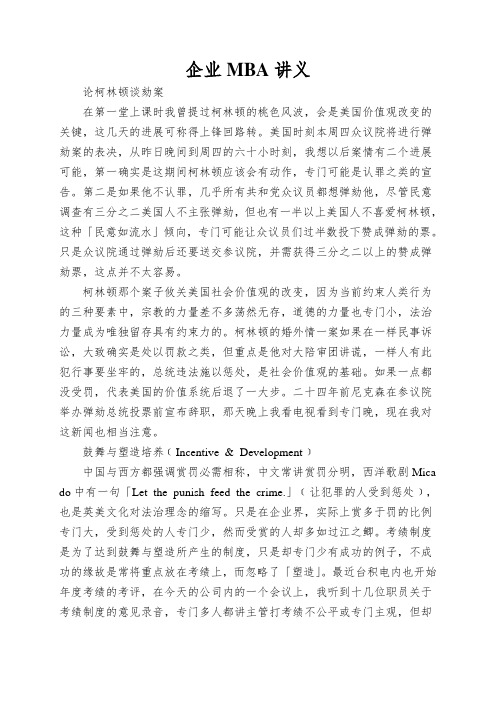
企业MBA讲义论柯林顿谈劾案在第一堂上课时我曾提过柯林顿的桃色风波,会是美国价值观改变的关键,这几天的进展可称得上锋回路转。
美国时刻本周四众议院将进行弹劾案的表决,从昨日晚间到周四的六十小时刻,我想以后案情有二个进展可能,第一确实是这期间柯林顿应该会有动作,专门可能是认罪之类的宣告。
第二是如果他不认罪,几乎所有共和党众议员都想弹劾他,尽管民意调查有三分之二美国人不主张弹劾,但也有一半以上美国人不喜爱柯林顿,这种「民意如流水」倾向,专门可能让众议员们过半数投下赞成弹劾的票。
只是众议院通过弹劾后还要送交参议院,并需获得三分之二以上的赞成弹劾票,这点并不太容易。
柯林顿那个案子攸关美国社会价值观的改变,因为当前约束人类行为的三种要素中,宗教的力量差不多荡然无存,道德的力量也专门小,法治力量成为唯独留存具有约束力的。
柯林顿的婚外情一案如果在一样民事诉讼,大致确实是处以罚款之类,但重点是他对大陪审团讲谎,一样人有此犯行事要坐牢的,总统违法施以惩处,是社会价值观的基础。
如果一点都没受罚,代表美国的价值系统后退了一大步。
二十四年前尼克森在参议院举办弹劾总统投票前宣布辞职,那天晚上我看电视看到专门晚,现在我对这新闻也相当注意。
鼓舞与塑造培养﹝Incentive & Development﹞中国与西方都强调赏罚必需相称,中文常讲赏罚分明,西洋歌剧Mica do中有一句「Let the punish feed the crime.」﹝让犯罪的人受到惩处﹞,也是英美文化对法治理念的缩写。
只是在企业界,实际上赏多于罚的比例专门大,受到惩处的人专门少,然而受赏的人却多如过江之鲫。
考绩制度是为了达到鼓舞与塑造所产生的制度,只是却专门少有成功的例子,不成功的缘故是常将重点放在考绩上,而忽略了「塑造」。
最近台积电内也开始年度考绩的考评,在今天的公司内的一个会议上,我听到十几位职员关于考绩制度的意见录音,专门多人都讲主管打考绩不公平或专门主观,但却没想到考绩有「塑造我」的功能。
- 1、下载文档前请自行甄别文档内容的完整性,平台不提供额外的编辑、内容补充、找答案等附加服务。
- 2、"仅部分预览"的文档,不可在线预览部分如存在完整性等问题,可反馈申请退款(可完整预览的文档不适用该条件!)。
- 3、如文档侵犯您的权益,请联系客服反馈,我们会尽快为您处理(人工客服工作时间:9:00-18:30)。
(一)“权力制衡”
宪法将提出弹劾案和审议弹劾案的权力分别授予国 会众议院和参议院,其目的也是为了使国会内的两 院相互之间有所制衡。美国制宪者最忧虑的政体危 机之一就国会的擅权或议员们的暴政,因而也不愿 意由国会中的某一院独自行使弹劾的权力。
此外,宪法规定参议院在审议总统弹劾案时,必须 由最高法院首席大法官主持,也有由法院监督国会 行使弹劾权力,保障弹劾依法、公正进行的意思。 可见,美国的总统弹劾制度,是一种内外多重的制衡 机制。
“ 贝壳弹劾”的突出特点就是由公民直接行使 监督权,对全体公民进行监督。“贝壳弹劾”之所 以被称之为弹劾制度的最初渊源,最为主要的原因 就是在“贝壳弹劾”中,提出放逐投票由公民会议 举手表决,决定放逐投票由公民通过贝壳的方式来 决定,这同弹劾制度中提出弹劾机关与审理弹劾机 关相互分离机制具有同一性。
古罗马在稍后时代形成了一套专门的监察官制度。罗马 监察官制度与“贝壳弹劾”相比,一个巨大的进步就是形成 了国家权力对国家权力与公民权利的监督。显然,它更接近 于弹劾制度中的国家权力对国家权力的监督,罗马监察官制 度是一种由上而下的监察制度,弹劾制度更多地体现为一种 平行的权力监督。因此,监察官制度同弹劾制度是两种完全 不同的制度。
二、弹劾制的起源
克里斯提尼在雅典的民主政治建设, 有两项重要内容:一是进行公民会议选举, 确立公民会议权威;二是创设了“贝壳弹 劾”。所谓“贝壳弹劾”,是指任何公民 都可向公民会议检举并提出放逐某人,由 公民会议举手表决是否举行放逐投票。如 果多数通过,随即在各部落市场中设置投 票箱,由公民把对方的名字写在贝壳上 。
弹劾作为一种宪法程序可追溯至14世纪的英国。
拉蒂默案件在英国历史上首次确立了由下院控诉,由上院审 判的弹劾程序的法律构架,成为英国弹劾制度的奠基石。 英国弹劾制度逐步形成了以下一些特点 : ( 1)在弹劾程序中, 议会下院充当原告 ,对被告提出弹劾 ( 公诉 ),上院贵族担任法 官进行审判;(2)被告即被弹劾者既可是王宫大臣,也可是 平民商人;(3)弹劾罪既包括刑事犯罪也包括非刑事犯罪, 即政府大臣和法官们不仅因为判国罪、贿赂罪、企图推翻国 家根本法、实行独裁和专制受到弹劾,而且也因为严重渎职 和行为不检受到弹劾;若弹劾罪成立,被告不仅被剥夺永久 担任公职的权利,还将受到带有刑事判决性质的处罚,如被 处死、流放、监禁和罚款等。
第六专题
从克林顿弹劾案看美 国的弹劾制度
一、克林顿弹劾案概况
美国总统克林顿私生活不检,绯闻颇多,且不断被曝光, 这给他的政敌——共和党人借以发动一场空前规模的“倒 克运动”提供了“炮弹”。克林顿与前白宫实习生莫尼 卡· 莱温斯基(Monica Lewinsky)私通的隐情是由莱温斯 基本人吐露给她的好友、五角大楼雇员琳达· 特里普 (Linda Tripp ),而后又由特里普捅出来的。
三、弹劾制的法律基础
美国总统弹劾制度是由1787年宪法设定的,因为对总统进行弹劾在根本上是一 个宪法制度问题,不仅涉及总统的职权和对总统的约束,而且涉及总统与国会 的关系,同时还有司法的参与。美国总统弹劾制度的基本框架,主要见之于美 国宪法的如下条款: 第一条第二款:“只有众议院具有提出弹劾案的权力”。 第一条第三款:“所有弹劾案,只有参议院有权审理。在开庭审理弹劾案时, 参议员们均应宣誓或作代誓之宣言。如受审者为合众国总统,则应由最高法院 首席大法官担任主席;在未得出席的参议员的 2/3 的同意时,任何人不得被判 有罪。”“弹劾案的判决,不得超过免职及取消其担任合众国政府任何有荣誉、 有责任或有俸给的职位之资格,但被判处者仍须服从另据法律所作之控诉、审 讯、判决及惩罚。” 第二条第二款:“总统有权批准关于背叛合众国的罪犯的缓刑和赦免,惟弹劾 案不在此限。” 第二条第四款:“合众国总统、副总统及其他所有文官,因叛国、第二款:“一切罪案,除弹劾案外,应由陪审团审判。
(三)“法律面前人人平等”
同“法律至上”一样,它不仅仅是一个原则或口号,而 是必须制度化、程序化。美国的总统弹劾制度,同样是实现 这一原则的重要法律制度。 法律面前人人平等也体现在对被弹劾总统的法律处置上。 按照美国宪法的规定,如果参议院审议之后经出席参议员的 2/3 多数同意认定总统犯有“叛国、贿赂或其它重罪和轻 罪”,那么总统弹劾案的判决,仅仅限于免去总统的职务以 及剥夺其担任或享受合众国的任何荣誉职位、有责任的职位 (信用职位)或有俸禄的职位(有酬职位)的资格。而且,被 国会弹劾定罪的总统,“仍须服从另据法律所作之控诉、审 讯、判决及惩罚”。
(二)“法律至上”
立宪政体和法治的一个核心同时也是关键的原则, 就是宪法和法律具至高无上的权威,任何政府机 构和政府领导人,都不能凌驾于法律之上或超然 于法外。
只有当一个国家的政体结构和法律体系具体体现 了“法律至上”的要求,并通过政体和各种法律 手段来保障法律至上的权威,“法律至上”才能 是实实在在的。
自1998年1月中旬起,斯塔尔开始广泛调查,搜集了大量证据。共和党人乘机利用绯 闻案向克林顿发动了强大攻势。
9月9日,斯塔尔将弹劾克林顿的长达 445页的调查报告和分两辆车装运的36 箱证据材 料送抵众议院。 10月8日,众议院以258票对176票通过了司法委员会要求对克林顿进行弹劾调查的决 议,弹劾程序正式启动。 12月11--12日,众议院司法委员会表决通过了弹劾克林顿的4 项条款: 1.在莱温斯基 绯闻问题上对联邦大陪审团犯了伪证罪; 2.在宣誓的情况下撒谎; 3.妨碍和阻挠司 法调查;4.滥用总统职权。 12月9日,众议院通过了作伪证和妨碍司法两项弹劾条款。克林顿表示,他决不辞职, 将继续工作到任期的最后一个小时。 1999年1月7日,众议院司法委员会主席海德率领 13名众议员来到参议院,宣读了对 克林顿的两项弹劾指控。参议院正式开始审理弹劾案。 弹劾审判历时 36天,到 2月 12日落下帷幕。参议院分别以 45票对 55票和 50票对 50票 否决了作伪证和妨碍司法两项条款。由于两项条款均未能达到总数的2/3,最高法院 首席法官威廉· H.伦奎斯特(Willam H. Rein 2quist)宣布克林顿无罪。至此,在全国 范围沸沸扬扬搞了一年多的弹劾总统案终告结束。
